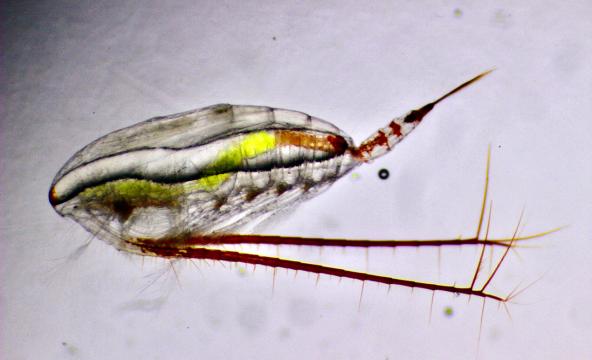Dangerous lipids. Researchers at Nord University have examined how oils from microorganisms can help the body to handle dangerous lipids. Photo: Ingebjørg Hestvik
Cardiovascular diseases are the number one cause of death globally. The underlying cause is often atherosclerosis. The culprit, the "bad" LDL cholesterol, increases in our blood when we consume unhealthy diets rich in fats. Now, researchers at Nord University have examined how oil from a specific microbe can help the body handle these dangerous lipids.
“At Nord University, we work with bioactive components from microorganisms, where we also look for alternatives to fish oils. We aim to study how such products can be used to improve people's health. If the whole world is to meet its omega-3 oil needs from fish oil, there will soon be a significant shortage of such oils. Therefore, we need alternative sources”, said researcher Adnan Gora.
The researchers at Nord University have therefore looked at how oils from the marine fungus-like microorganism Schizochytrium affect the blood, liver, and intestines of zebrafish. Schizochytrium stands out as being exceptionally rich in DHA, one of the most important omega-3 fatty acids.
If the whole world is to meet its omega-3 oil needs from fish oil, there will soon be a significant shortage of such oils. Therefore, we need alternative sources
Adnan Gora, researcher
Early signs of cardiovascular diseases in humans can be simulated in zebrafish

To study the effect of microbial oil, the researchers chose to use the small aquarium fish zebrafish. Gora explains that zebrafish have a range of advantages as experimental animals in these types of studies. They are small, and as young fish, they are transparent. This allows researchers to use fluorescence techniques to gain new insights about cardiovascular diseases.
“One can simulate in zebrafish what are early signs of cardiovascular diseases in humans. It is also likely that medications effective in zebrafish could prevent diseases in humans”, Gora said.
In this study, researchers for the first time were able to profile hundreds of different lipids in the blood of zebrafish to see how microbial oil affects the composition of these.
Full reduction
Gora and his colleagues fed the fish a diet high in cholesterol, where one group also received a supplement of oil from Schizochytrium in their food. The experiments showed that the supplementation of microbial oil mitigated the adverse effects of the diet with too much cholesterol.
“In our study, we found that microbial oil lowered the level of both cholesterol and triglycerides in the blood. The oil also changed the composition of lipids in the blood similarly to what is seen when using fish oils”, Gora explained.
Triglycerides are lipids known to increase the risk of cardiovascular diseases if there is too much of them in the blood. Research conducted on humans suggests that it is not enough to increase the proportion of HDL cholesterol (the “good” cholesterol) in the blood if the level of triglycerides is not simultaneously reduced.
“Some studies show that the ideal scenario is to achieve a simultaneous increase in HDL and a reduction in triglycerides in the blood. Our study with oil from Schizochytrium simulated just such a condition”, said Gora.
The experiments further showed that the level of LDL cholesterol in fish that received microbial oil in addition to a high-cholesterol diet was reduced all the way down to the same level as in fish that had not received a high-cholesterol diet.
“Generally, this is something that is difficult to achieve in such experiments. It shows the capacity of microbial oil to influence the molecular processes in the fish”, said Gora.
Turning genes on and off

To look more closely at how microbial oil affects cholesterol in the body, the researchers chose to look at how the genes in the zebrafish reacted to the different diets.
“What we saw was that fish that had been fed a diet with very high levels of cholesterol reacted by turning off the activity of a number of genes”, said Gora.
The genes that were "turned off" by high cholesterol levels in the food were genes that normally assist in the body's own cholesterol production.
“Cholesterol synthesis only occurs when there is a shortage of cholesterol. So, when the body detects that there is a surplus, it stops producing it. When we added microbial oil to the diet, these genes were activated again. This indicates that the effect of high cholesterol was no longer present”, Gora said.
Moreover, evidence strongly suggests that genes contributing to the production of “good” cholesterol – HDL cholesterol – are activated when the fish are given microbial oil in their food.
The researchers also looked at how the liver reacted to the different diets. They saw that fish on a high-cholesterol diet had significantly more so-called vacuoles in the liver. These are small "bubbles" in the cells that mostly contain fat. Fish that had also received microbial oil had fewer such vacuoles. The researchers could also see differences in the size of the vacuoles in the different groups.
A well-suited experimental animal
Gora believes the use of zebrafish in such studies will be invaluable to get to the bottom of how cholesterol is regulated and thus reduce the extent of cardiovascular diseases.
“Zebrafish prove to be a good model organism. In this study, we have shown that the intestine plays a central role in regulating cholesterol, specifically the middle part of the intestinal tract. Here, the genes in the intestine function as switches to regulate cholesterol in the blood”, said Gora.

Zebrafish is also used as a model organism in other research projects at Nord University.
“We use zebrafish to study the potential of compounds extracted from macroalgae, microalgae and other microbes for biomedical purposes. This includes their possible use as functional supplements, said Kiron Viswanath, , leader of the Algal and Microbial Biotechnology group, who points out to the on-going EU project Algae4IBD.
Here the researchers focus on inflammatory bowel disease, that includes Crohn’s disease and ulcerative colitis.
The research of Adnan Gora was supported by Netaji Subhas-ICAR international Fellowships (NS-ICAR IFs) from the Indian Council of Agricultural Research, India, in collaboration with Nord University.
Read more: Protective mechanisms of a microbial oil agRead more: Protective mechanisms of a microbial oil against hypercholesterolemia: evidence from a zebrafish model (Frontiers | Protective mechanisms of a microbial oil against hypercholesterolemia: evidence from a zebrafish model (frontiersin.org))
Facts about cholesterol:
Cholesterol is fundamentally a natural substance in our body, which we need for a variety of vital functions.
Therefore, our body itself produces the cholesterol it needs.
However, a Western lifestyle with a high intake of saturated fatty acids often leads to disturbances in cholesterol production, which results in an increase in the 'bad' LDL cholesterol.
At the same time, there is a type of cholesterol – HDL cholesterol – that counteracts the negative effects of LDL cholesterol. Hence, HDL cholesterol is often referred to as the 'good' cholesterol.







